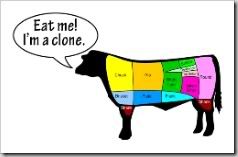FDA. Trusty Guardian of Corporate Health
Part One: "I'll have what he's having."
Now that the FDA has determined meat from cloned animals is safe to eat, all that remains to be decided is the matter of labeling: to label or not to label?
 On the one hand, not labeling meat sourced from cloned animals could be seen as overly paternalistic, given that it confers the power to decide what's ok to eat to an agency of the federal government, a decidedly anti-conservative policy stance for a government run by a conservative party. Of course I mean "anti-conservative" in the old-fashioned sense, not in the nouveau, bloated-government, record-deficit sense.
On the one hand, not labeling meat sourced from cloned animals could be seen as overly paternalistic, given that it confers the power to decide what's ok to eat to an agency of the federal government, a decidedly anti-conservative policy stance for a government run by a conservative party. Of course I mean "anti-conservative" in the old-fashioned sense, not in the nouveau, bloated-government, record-deficit sense.
On the other hand, not labeling meat sourced from cloned animals could also be seen as pro-business, which clearly is a conservative policy stance, inasmuch as it secures the ability of producers to enhance their profitability by whatever cost-savings cloned meat can provide, without the looming threat of  superstition-fueled neo-commie farm-hippie protestors fire-bombing our Mickey D's. It calls to mind just how much nepotism has done to destroy the family farm, now a mere withering vestige of its Norman Rockwell heyday, perhaps even beyond the salving powers of a permanently dead death-tax.
superstition-fueled neo-commie farm-hippie protestors fire-bombing our Mickey D's. It calls to mind just how much nepotism has done to destroy the family farm, now a mere withering vestige of its Norman Rockwell heyday, perhaps even beyond the salving powers of a permanently dead death-tax.
But how about that Smithfield company? Sounds like an honorable ancient Virginia lineage of proud ham craftsman to me. Why not just leave it at that? Who needs to look under the hood if the car runs fine? Feed-lot politics, with its wearying entourage of nattering nabobs harping on antibiotics,  hormones, overflowing ponds of fecal waste and E. Coli in our organic spinach, only serve to obscure the honorable image of a
hormones, overflowing ponds of fecal waste and E. Coli in our organic spinach, only serve to obscure the honorable image of a  venerable American company spirally dissecting our holiday meal with love, care and a high-fructose corn syrup glaze.
venerable American company spirally dissecting our holiday meal with love, care and a high-fructose corn syrup glaze.
Now, as policy, protecting the public from information has succeeded admirably in the past. The deployment of recombinant BST in the milk-supply went almost unnoticed after the FDA forbade milk-producers from making specious claims that natural BST produced by cows was any better than the recombinant version, produced by bacteria. After all, genetically-engineered bacteria are friendly bacteria. They are the microbial world's version of the golden retriever, wanting nothing more than to fetch your slippers, or in this case bovine somatotrophic growth hormone.
 Sure, when rBST was introduced, there was some brouhaha about bovine mastitis and pus in the milk supply, but by now all that has faded away like a bad nightmare. Just try finding pus in your milk.
Sure, when rBST was introduced, there was some brouhaha about bovine mastitis and pus in the milk supply, but by now all that has faded away like a bad nightmare. Just try finding pus in your milk.
 And harken back to the shining example of "country of origin" labeling for meats. Although the original law requiring such labeling was signed by President Bush in 2002, subsequent, better laws have since been signed, again and again in fact, busy beaver that he is, all serving to delay the implementation of labeling for the purpose of gathering further rounds of illuminating comments from AgriGeniuses. So don't sweat it until September 2008, at least. I'll bet the President gets a lot of comments saying "delay it some more." Think about it, why would you need to crowd more information on those tiny little labels, already over-burdened with so much nutritional gobbledygook, especially now that scientists have got the mad-cow problem all worked out.
And harken back to the shining example of "country of origin" labeling for meats. Although the original law requiring such labeling was signed by President Bush in 2002, subsequent, better laws have since been signed, again and again in fact, busy beaver that he is, all serving to delay the implementation of labeling for the purpose of gathering further rounds of illuminating comments from AgriGeniuses. So don't sweat it until September 2008, at least. I'll bet the President gets a lot of comments saying "delay it some more." Think about it, why would you need to crowd more information on those tiny little labels, already over-burdened with so much nutritional gobbledygook, especially now that scientists have got the mad-cow problem all worked out.
Hello Dolly!
So, to consumers already made jittery by information-overloaded labeling, and gripped by irrational fears of things already officially deemed safe, I say:
 Let's make this a time to honor the hero's journey of Dolly the cloned sheep, and her infinite-series of sisters, as they doggedly make their way onward to the dinner plates of all free Americans. Not free, in the sense of being "free to choose what's best for oneself," but free in the more symbolic sense that our enemies love to hate so much.
Let's make this a time to honor the hero's journey of Dolly the cloned sheep, and her infinite-series of sisters, as they doggedly make their way onward to the dinner plates of all free Americans. Not free, in the sense of being "free to choose what's best for oneself," but free in the more symbolic sense that our enemies love to hate so much.





5 comments:
Even without cloning, our food supply is crazily out of wack. You MUSt see the incredible film: Our Daily Bread. A wordless, hauntingly beautiful, absolutely objective, look- and look alone- at industrial food production in overdrive.
www.ourdailybread.at
Take care,
Alan
i couldn't agree more that our food supply is crazily out of whack, but for me the cloning question points directly to the most pivotal issue regarding the food supply: the right to choose what you eat.
food, in a sense, comes with an implied warranty, and when information is withheld that would allow you to discriminate between what your food is and what it merely appears to be, your right to choose is countermanded.
people have a right to make up their own minds about what is safe and nutritious, even if they base their decisions on erroneous information or superstition. you can't get much more personal than what goes into your body.
that said, i have a soft spot in my heart for the NYC trans-fat ban. i know it contradicts, almost directly, my avowed stance in favor of freedom-of-choice, but it seems like there is a point when the cost to society of a public-health risk can trump individual freedom.
i cant find a logical basis for reconciling these beliefs, if you know of one please fill me in. it's the same sort of territory as smoking bans, helmet laws, and seatbelt laws.
thanks for letting me know about the film. i'll have look for sure.
best regards
clyde
When medical costs are shared across society, which is the case for most societies, personal habits become the provenance of the state. In the UK recently the the National Health System has started to place smokers and overeaters lower in the queue for routine surguries, like knee and hip replacements.
We could go further than this, such as tax deductible gym memberships, and mandatory use of those sandy stickies in our bathtubs.
It's a funny mix of what gets over. We tolerate mandatory seat belts and car seats, but smoking laws are based more on worker safety.
as far as i can tell, US outlays for Medicare in the year 2004 comprised almost 12% of the federal budget and rang up a bill of $269 billion.
that's a compelling state interest in public health and it's only going up.
most of the blockbuster drugs being sold today are ones that counter the harmful effects of a bad diet, like high cholesterol, acid reflux, and type 2 diabetes. these are the drugs that cost four dollars a pill.
so yeah, when the government pays for that, we have an interest in promoting (at the very least) healthier habits.
part 2 of my FDA blog entry will focus on the contradictory aspects of big pharma.
William Saleten of Slate defends cloned meat.
Post a Comment